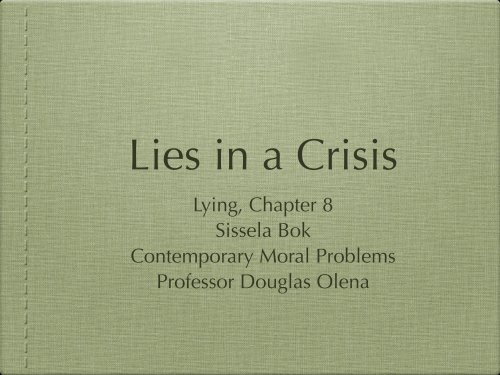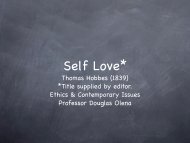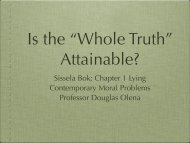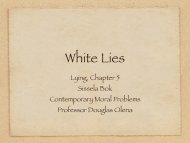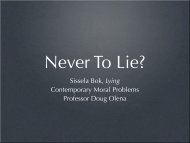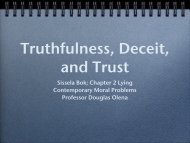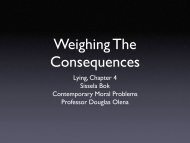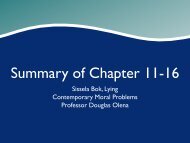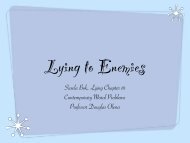Lying, Chapter 8 Sissela Bok Contemporary Moral ... - Olena's
Lying, Chapter 8 Sissela Bok Contemporary Moral ... - Olena's
Lying, Chapter 8 Sissela Bok Contemporary Moral ... - Olena's
You also want an ePaper? Increase the reach of your titles
YUMPU automatically turns print PDFs into web optimized ePapers that Google loves.
Lies in a Crisis<br />
<strong>Lying</strong>, <strong>Chapter</strong> 8<br />
<strong>Sissela</strong> <strong>Bok</strong><br />
<strong>Contemporary</strong> <strong>Moral</strong> Problems<br />
Professor Douglas Olena
<strong>Chapter</strong> Preface<br />
• “May not a singular necessity supercede the common rule<br />
of veracity, too?” Francis Hutcheson
<strong>Chapter</strong> Outline<br />
• The Acute Crisis 108<br />
• Prolonged Threats to Survival 110<br />
• Line Drawing 113<br />
• Danger of Expanding Deceptive Practices 119
The Acute Crisis<br />
• 108 “How might the test of publicity discriminate among<br />
the many crisis situations where lies are told?”<br />
109 1. “For those confronted with a such a crisis, there is little time to<br />
reflect. But could they do so beforehand, they would, I believe, be able<br />
to justify such lies<br />
2. “If the claim that an innocent life can be saved is justified, it will offset<br />
in most minds the negative value ordinarily placed on lies.”<br />
3. “The life threatened is itself an innocent one.”<br />
4. “The lie to protect a murderer’s intended victim is a very isolated<br />
instance. It would neither be likely to encourage others to lie nor make it<br />
much more likely that the person who lied… come to lie more easily or<br />
more often.”
The Acute Crisis<br />
• 109 “For these reasons, the test of public justification<br />
could be satisfied.”<br />
• 110 Does this lie to protect another apply equally to lying<br />
to protect one’s self?<br />
• <strong>Bok</strong> suggests that there is no reason to think altruistic lies<br />
(lies for others) are inherently better or worse than selfserving<br />
lies to protect one’s self.
Prolonged Threats…<br />
• 111 “In extreme and prolonged threats to survival, as in<br />
plagues, invasions, and religious or political persecution,<br />
human choice is intolerably restricted.”<br />
• “Survival alone counts; moral considerations are almost<br />
obliterated.”<br />
• “For many, the moral personality is itself crushed; the<br />
ability to choose is destroyed.”
Prolonged Threats…<br />
• 112 When “society is in a state of collapse… a lie won’t<br />
add to the chaos or the degradation.”<br />
• In cases like this public debate is beside the point.<br />
• 113 “There comes a point of human endurance and of<br />
long-term threat beyond which justice is inoperative for<br />
sufferers, and where their adherence to moral principles<br />
cannot be evaluated by outsiders.”
Line Drawing<br />
• 113, 114 The story of Lycurgus<br />
• 115 “A person unjustly detained in a mental hospital…<br />
may have few, if any, means of attaining freedom. If a lie<br />
brings him in contact with a lawyer who can take up his<br />
cause or make the authorities believe that someone on the<br />
outside is going to publicize his plight, it might well stand<br />
up to the test of publicity.”<br />
• “The victim is powerless; his alternatives few and<br />
unsatisfactory. The danger is great and could be lifelong.”<br />
• The risk that deception will spread is slight.
Line Drawing<br />
• 115 “A more acute crisis, though less threatening to life or<br />
liberty, occurs when someone is forced to undergo<br />
sterilization, or is threatened with some unwarranted<br />
inroad on bodily integrity.”<br />
• “But there are a number of common situations where the<br />
degree of danger, and the obligation to submit to it, are in<br />
dispute.”<br />
• 116 Story of the boy with psychological problems…
Line Drawing<br />
• 118 “Where is that turning point?<br />
• What is the limit of expectable heroism?<br />
• Where do powerlessness, external threat, and a prevailing<br />
practice so work together that corruption is the norm,<br />
honesty the exception.<br />
• The absolutist rejection of all lies cannot suffice in such<br />
predicaments. Nor can the simplest belief that, since most<br />
of us won’t encounter dire emergencies that only a lie can<br />
dispel, we can follow the absolutists in practice, even<br />
though in principle we might admit an exception or two<br />
to their prohibition of all lies.”
Line Drawing<br />
• 119 “Line-drawing is a hard task once one leaves the<br />
domain of the clear-cut life-threatening crisis.”<br />
• “It becomes difficult, then, to answer the questions<br />
relevant to moral justification.”<br />
1. “Asking whether there are truthful alternatives, is hard to<br />
answer wherever there is uncertainty about the various<br />
alternatives and the hardships they may impose or<br />
avert.”<br />
2. “Asking what moral arguments can be made against the<br />
lie, will encounter problems connected with the<br />
excuses claiming non-maleficence.”
Line Drawing<br />
• 119 “The test of publicity with respect to such lies would<br />
therefore have to address the debate, not only to the lies in<br />
isolation, but to the social practices of which they form a<br />
part.”
Danger of Expanding<br />
• 119 What is the danger of expanding deceptive practices?<br />
• “It is the fear of such a spread which underlies the<br />
reluctance to condone professional deception, no matter<br />
how indicated it may seem in the individual case.”<br />
• 120 “Doctors, lawyers, journalists, secret-service agents,<br />
and military personnel… may find themselves repeatedly<br />
in straits where serious consequences seem avoidable<br />
only through deception.”
Danger of Expanding<br />
• 120 Watergate and All the President’s Men.<br />
• 121 “What is more troubling in the book than the lies<br />
themselves is the absence of any acknowledgment of a<br />
moral dilemma.”<br />
• “Wherever the opportunities for deception abound,<br />
rewards are high, and time for considering alternatives<br />
often short— the danger of the formation of deceptive<br />
habits is much greater than in other lines of work.”<br />
• “The word ‘crisis’ then becomes a sufficiently elastic term<br />
to suit every occasion for lies.


